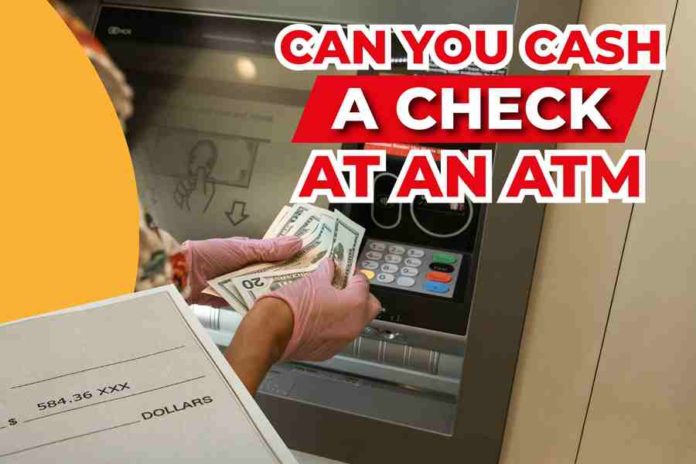Have you ever been in a situation where you need cash quickly but don’t have the time to wait in line at the bank? Can you cash a check at an ATM? The answer is yes, you can! Cashing a check at an ATM offers advantages such as convenience, speed, and ease of use. However, there are also some drawbacks to consider. In this article, we’ll take an in-depth look at the pros and cons of cashing a check at an ATM. We’ll cover topics such as the fees associated with ATM check cashing, the security features that protect your funds, and other considerations to keep in mind. By the end of this article, you’ll better understand whether cashing a check at an ATM is the right choice for you.
Can You Cash A Check At An ATM?
You can cash a check at an ATM if your bank provides this service. Your bank may provide the option to cash checks at ATMs, and you may also be able to use other banks’ ATMs for this purpose. The downside to cashing checks at an ATM is that you may be charged a fee for this service. Fees vary from bank to bank, so it’s best to check with your specific financial institution before cashing a check at an ATM.
Pros Of Cashing A Check At An ATM
1. Convenience
There are a few reasons you may want to cash a check at an ATM. Perhaps you need the cash immediately, or you’re simply in a rush. There’s no need to wait in line at the bank when you can get cash immediately. You’ll be able to easily access your money from your bank account.
2. Speed
Cashing a check at an ATM may allow you to access your money faster than going into the bank branch or ATM. Most banks will not cash checks for another 24 hours, so if you’re in a hurry, this could be beneficial for you.
3. Flexibility
If you’re unable to go into your local bank branch, an ATM is a great alternative. You can access your money whenever you want without having to take time out of your schedule. You’ll also have the added benefit of not having to stand in line at the bank.
4. No Fees Or Charges
Unlike some banks, most ATM machines will not charge a fee for cashing a check at an ATM. Most banks will charge you $5-$10 for cashing a check if it is drawn on another bank account and if it exceeds the limit on that account. This fee can be waived if you have direct deposit or make periodic deposits into your checking account from another source, such as payroll checks or direct deposits from a retirement plan. If you have any questions about this, please contact us for more information about electronic checks and banking services offered by First National Bank Of Pennsylvania.
5. Security Features
ATM machines allow customers to provide a pin number so that they can prove that they are the person who is cashing the check. This is a security measure to ensure that no one else can access your money if you’re not around.
6. Easy Access
If you’re unable to go into a bank branch, an ATM is a great alternative. You can access your money whenever you want without having to take time out of your schedule. You’ll also have the added benefit of not having to stand in line at the bank.
7. Convenience Fees And Charges
Not all banks will cash a check for free or for no charge at all. Some banks will charge a fee if there is not enough money in the account to cover the check amount or if there are insufficient funds in the checking account itself to cover the check amount. The bank may also charge a fee if you have insufficient funds in your account but can cover this with an overdraft or loan from another source. Please contact us for more information about electronic checks and banking services offered by First National Bank Of Pennsylvania.
Cons Of Cashing A Check At An ATM
1. Fees
ATM fees vary from one bank to the next, but most banks charge a $1.50 fee for each check you cash. If you take out a cash advance, your bank will charge an additional fee for that transaction as well. Some banks may also charge a fee for using their ATM if you’re not a member of their credit union or another financial institution. Banks can also charge ATM surcharges if you need to withdraw more than $2,000 in cash or use your debit card at an ATM.
2. Security
The safety and security of your money at an ATM are top priorities for banks and other financial institutions. The Federal Deposit Insurance Corporation (FDIC) insures most checking accounts up to $250,000 per depositor per account at FDIC-insured institutions (this limit is separate from your deposit insurance coverage). However, due to the way that ATMs work, there is no way to ensure that your money will be safe while you’re using them.
3. Convenience
Cashing a check at an ATM can be convenient, especially if you need to get money quickly. However, it can also be inconvenient. You may have to wait in line for an extended period, and you may have to leave your home or office to use the ATM. If you can go out of your way, this could be a good use of time and energy that could be better spent doing other tasks. This is why some people prefer checking accounts over ATMs because they offer more convenience and security than checking account balances at an ATM.
Fees Associated With ATM
Check To Cash
1. The Fee For A Cash Advance On Your Atm Card
ATM check cashing may be convenient, but it is also expensive! The fee for a cash advance on your ATM card will depend on the amount of money you withdraw. To find out the fee for a cash advance, look at your online banking statement or call your bank. If you need to withdraw more than $100, the fee will cost you $2.50 or more. For example, if you need to withdraw $200 from an ATM, you’ll pay a fee of $4.50! To avoid this additional cost, try requesting a loan from your bank instead of taking out cash from an ATM. You can get up to three free withdrawals per month from the loan account and avoid paying any fees associated with using an ATM.
2. The Fees Associated With Using Non-Atm Check Cashing Services
Non-ATM, check cashing services are also costly and can be risky to use. For example, some check cashing services charge a fee for each check that you cash. If you have a lot of checks to cash and the fees are too high, consider using your bank’s ATM rather than dealing with a third-party check cashing service.
3. The Fees Associated With Using Your Own Personal Check Casher
If you don’t have access to any other funds and need to cash a large number of checks quickly, you may want to consider using your own personal check casher. While this may seem like an expensive option at first glance, it could actually save you money in the long run! When your bank issues a stop payment on one of your checks, it will also issue a stop payment on all of the checks that were issued by your personal check casher. If these checks are also stopped by the bank, then that means that all of the checks from your personal check casher will also be stopped and returned to you. This can result in significant cost savings if you have a lot of checks to cash.
4. The Fees Associated With Using A Check Cashing Service To Cash Checks
Check cashers are a convenient option, but they are also expensive. You will pay a fee for each check that you cash at a check cashing service. The fee is usually $10 or more, which can be costly if you’re trying to cash several checks in one day! To avoid this cost, try looking into free ways to get money online.
5. The Fees Associated With Using A Payday Loan Service
If you need money quickly, you may want to consider taking out a payday loan. These loans are usually very expensive, but they can be lifesavers if you need money fast and don’t have access to any other funds. Payday loans can typically be taken out for up to six months and have high annual percentage rates (APR). While these loans can be helpful, there are better options for most people. Consider looking into online ways to get money instead of using a payday loan!
Security Features That Protect Your Funds
1. Pin Unlocks The Atm
When you insert a check into an ATM, the machine prompts you to enter your PIN. If you have a PIN, your check will be accepted.
2. The Atm Locks After Each Transaction
After you enter your PIN, the ATM will lock automatically. This is another way that the machine protects your funds from unauthorized access by anyone else who might be nearby.
3. The Atm Camera Records Every Transaction
The camera on an ATM records every transaction at the machine. If someone were to steal cash from your account, they would be caught on tape! That’s one less risk to worry about!
4. The Atm Has A Panic Button
If you ever need to use the ATM in a hurry and there’s no one available to help you, you can press the panic button. This will alert the bank staff, who will then be able to assist you quickly.
5. The Machine Has Gps Capabilities
The machine can record your location at all times so that if it were ever stolen, it could be tracked down by authorities. You won’t have any worries about your money being stolen from an ATM!
Conclusion
Overall, cashing a check at an ATM can be a convenient way to access cash quickly in an emergency situation. However, you should be aware of the pros and cons associated with this transaction. ATM checks to cash can be helpful in a wide variety of situations, but there are also some drawbacks to consider. You can protect yourself by verifying the legitimacy of the check and keeping in mind that cashing a check at an ATM may have an impact on your credit score.












